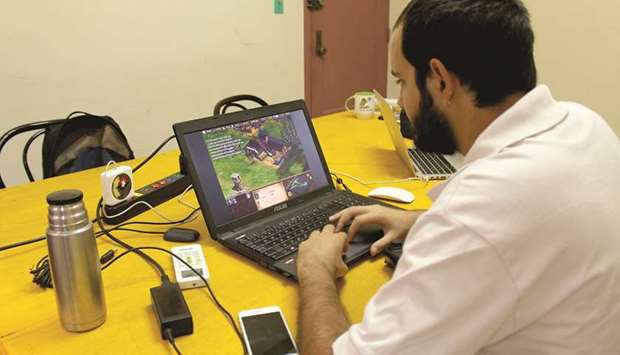connections, Cuba is perhaps one of the worst
places to live as an avid gamer. But the country’s
gaming fans are finding creative ways to build a
community. By Guillermo Nova
In today’s cyber world, gamers organise their championships online. But Cuban gamers are left out of the loop by restrictions on Internet service for private citizens. That’s why many are setting up their own local gaming community for offline battles.
“I can’t remember how it all started but I always liked video games and when the LAN parties began I started to play online and since then I’ve never stopped,” gamer Felix Manuel Gonzalez says.
A LAN party is a gathering of video gamers who have hooked up all their computers to play games like “Call of Duty,” “Dota 2” and “Warcraft” all night long.
Initially these events would take place in somebody’s house, but there were so many people who wanted to play that hundreds of gamers were flocking to Cuba’s LAN parties. They had to be held in large venues like cinemas in Havana such as the Yara or the Acapulco.
Cuban technology experts created the Snet – Street Network – 10 years ago as a way to counteract poor online access for Cubans. The Snet uses wireless networks through small devices to allow gaming in a closed network in the absence of Internet access.
“We wanted to game against each other and not against a computer. In the beginning we would gather together in somebody’s home but we couldn’t always do it and we looked for alternatives. At that time Wi-Fi technology was very unstable,” says Alejandro Cueto, the head organiser of the main Snet computing centre.
The Snet network came into being among a small group of friends, but slowly it began to grow following a pattern of circles whose diameters increased as technology improved. Currently the Snet network covers nearly all of Havana.
This offline connection has yet to spread to the rest of the country because it would need more powerful antennae to transmit over the sparsely populated areas between cities.
More than 15,000 users are connected to the Snet network in Havana, according to the organisers, while others have put the number at over 40,000.
“There is no place in Havana from which you can’t connect,” says Cueto proudly. Cueto explains that he built his first rudimentary Snet antenna with an aluminium doorframe when he was still a high school student.
Gaming passion allowed gamers to overcome technological barriers in Cuba, a country with one of the lowest Internet penetration rates in the world.
The authorities in Cuba allow Internet connections at home only for professionals such as physicians, journalists or university professors. However, in late 2016 the authorities launched a pilot project to grant online access to private citizens living in Old Havana.
Since 2015, public parks in nearly all of Cuba offer wireless Internet at a cost. Some 250,000 users hook up daily using rechargeable cards for under two dollars per hour. But this option is too expensive for gamers.
“The Internet situation in Cuba is different from other countries. The infrastructure is very poor and backward and users are highly educated and academically trained and they make the most of those precarious technical conditions,” says David Vazquez, the creator of technology website called “Cachivache Media” (Knick-Knack Media).
The gaming world in Cuba also has its own interactive digital magazine: “N1CKS,” created by a group of students at the Cuban Higher Institute of Design. They distribute the magazine every week on USB flash drives.
“We want to offer Cuban gamers a platform for them to share experiences,” says Rafael Santos, one of the creators.
Santos and his co-designers Frank Tamayo and Julio Jimenez, want their gaming magazine to reach beyond Havana. “We want to know what is happening all over the country with electronic games,” Santos explained.
The gamers’ phenomenon has increased in Cuba with thousands of followers. Several public tournaments made gamers become known in the country, but there is no legal framework setting guidelines for these cyber-gamer communities.
Independent groups like the Electronic Sports Association of Cuba, founded in 2007, are seeking to create a community for young people who engage in video games to socialise. Meanwhile the DotA Cuba group organises whole tournaments.
“Cuban gamers are just like gamers anywhere else in the world but they have to adapt to society and make do, because they cannot live away from gaming, they are just as committed to gaming” as all the others, said Felix Manuel Gonzalez, who makes sure to set aside two afternoons a week so he can play “Dota 2” in his spare time. – DPA

